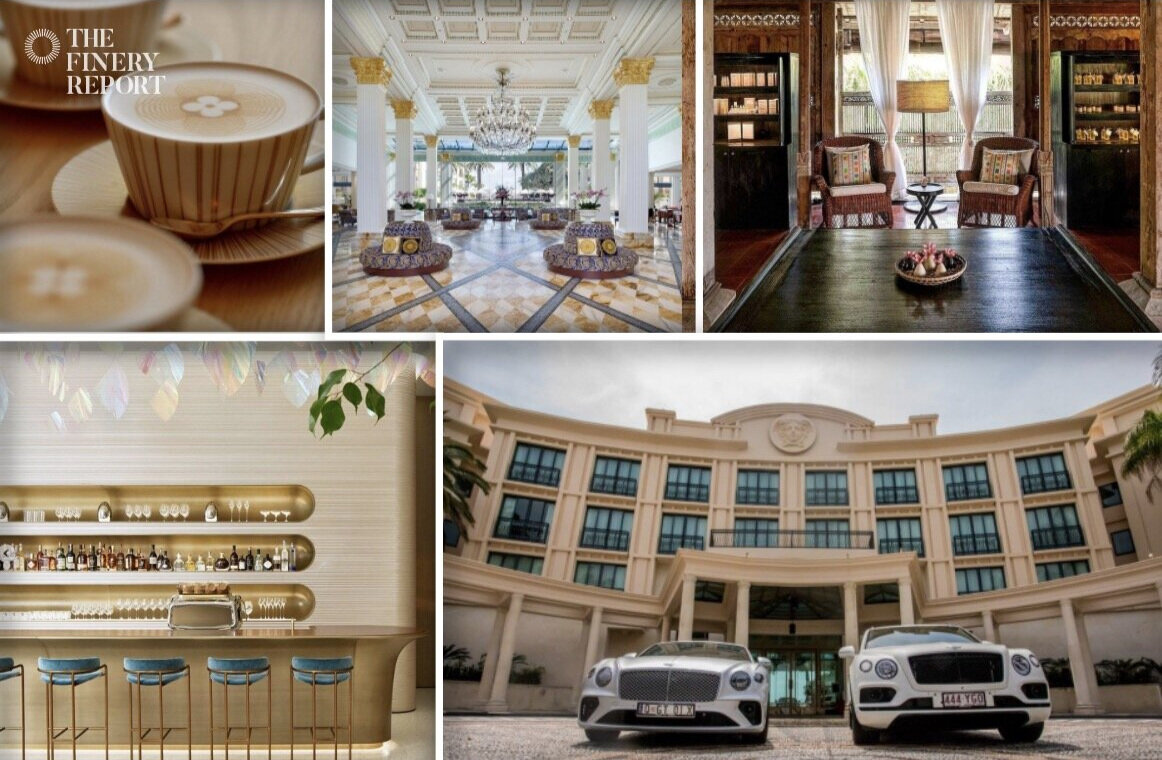The luxurious world of branded hospitality
Image: Top row from left to right - LE CAFE V via @louisvuitton, Baccarat Hotel via @baccarathotels, Bvlgari Resort Bali via @bulgarihotels. Bottom row from left to right - LE CAFE V via @louisvuitton, Palazzo Versace via @palazzoversacedubai
Louis Vuitton’s first-ever café in Osaka called LE CAFE V (@lecafev) and its exclusive restaurant Sugalabo V have opened their doors to the public on 15 February, 2021. Both the café and the restaurant are housed on the top floor of Louis Vuitton’s Osaka Midosuji store, connected by a speakeasy-esque trap door. There is also a beautiful cocktail bar and outdoor terrace, creating space for both guests who wish to enjoy a formal atmosphere and who want to enjoy the breeze while sipping their martini.
It wouldn’t be LV without awe-inspiring interior to set the experience and luxurious tone. Japanese architect Jun Aoki created a traditional Japanese Higaki-Kaisen ship-inspired interior, a nod to the building's billowing sail design. The tableware – designed by Tokujin Yoshioka – adds the finishing detail. He is also known as the fashion house's furniture and travel accessories creator specialising in contemporary, modern nature-inspired works.
Louis Vuitton is the latest addition to the growing list of luxury brands venturing out to hospitality. Taking advantage of an already existing area, it's a smart move for luxury brands to continue building their reputation. Beyond selling products, providing services and experience for consumers while they make purchases and interact with the brand is a powerful marketing strategy. Selling an experience will help elevate the vital areas of the brand: reliability, trust and prestige.
This movement is driven by a shift in consumer priorities. There is a growing number of people who are seeking to replace wearable items with experience. It's all about their values; where everything is based on doing over just having. By shifting its focus from selling tangible products, brands can build a long-term relationship with their consumers through the hospitality sector.
Today, brick-and-mortar retail stores are declining as e-commerce shopping is gaining traction. Brands must branch out and adopt numerous marketing strategies. They are tapping into the F&B and hotel sectors to acquire new customers and keep top customers loyal – it's beneficial to have a lifestyle component rather than a singular product.
This way, brands are also taking on an approachable manner to incite a feeling of warmth and welcoming to the guests. "Human interaction is still irreplaceable…this tangible experience can't be replicated online. Which makes the idea of food experiences a vital recipe for fashion success," said Filipino fast fashion conglomerate Ben Chan to F&B Report.
Luxury brands are eager to break through the hospitality market as it is projected to reach $116 billion by 2025. When luxurious hospitality is paired with fashion, it can create meaningful connections. "Everything you do must reflect luxury,” said Frank Schuetzendorf, former F&B director at the Hôtel Plaza Athénée in Paris. “It's about doing things right, the attention to detail, following through on everything," she added. It makes sense why these brands are going above and beyond – they want to build personalised experiences and services for their customers.
List of luxury brands with hospitality business:
1. Ralph Lauren: The Polo Bar in New York (opened in 2015), Ralph's Coffee & Bar in London (opened in 2017), RL Restaurant in Paris (opened in 2010) and Chicago (opened in 1999).
2. Tiffany: The Blue Box Cafe in New York (opened in 2017), London (opened in 2020) and Hong Kong (opened in 2019).
3. Gucci: Gucci Restaurant in Beverly Hills, Los Angeles (opened in 2018), 1921 Gucci Café in Shanghai (opened in 2015), Gucci Osteria da Massimo Bottura in Florence (opened in 2018).
4. Louis Vuitton coffee shop in Japan (opened in 2020).
5. Bvlgari: Bvlgari Resort in Bali (opened in 2006) and Bvlgari Hotel and Residences in London (opened in 2012).
6. Armani: Armani Hotel in Dubai (opened in 2010), Emporio Armani Caffé & Ristorante in Milan (opened in 2000).
7. Versace: Palazzo Versace on Gold Coast, Australia (opened in 2000).
8. Jacquemus & Kaspia: Oursin in Paris (opened in 2019).
9. Aimé Leon Dore: Café Leon Dore in New York (opened in 2019).
10. Christian Dior: Café Dior by Pierre Hermè, Seoul (opened in 2015).
11. Chanel: Coco Chanel Suite at the Ritz Paris (opened in 2016).
12. Diane von Furstenberg: The Grand Piano Suite design at Claridge's Hotel in London (opened in 2010).
13. Prada: Bar Luce in Milan (opened in 2017).
14. Burberry: Thomas's Café at Burberry in London (opened in 2015 – now closed).
15. Maison Kitsuné: Café Kitsuné in Seoul (opened in 2018), Jakarta (opened in 2020), Tokyo (opened in 2013), Paris (opened in 2019), Okayama (opened in 2019) and New York (opened in 2019).
16. Vivienne Westwood: Vivienne Westwood Café in Shanghai and Hong Kong (both opened in 2015).
17. Baccarat: Baccarat Hotel and Residences in New York (opened in 2015).
18. A.P.C.: Café A.P.C. in Paris (opened in 2019 – now closed).
19. Chanel and Ducasse Paris: Beige Alain Ducasse in Tokyo (opened in 2004).

